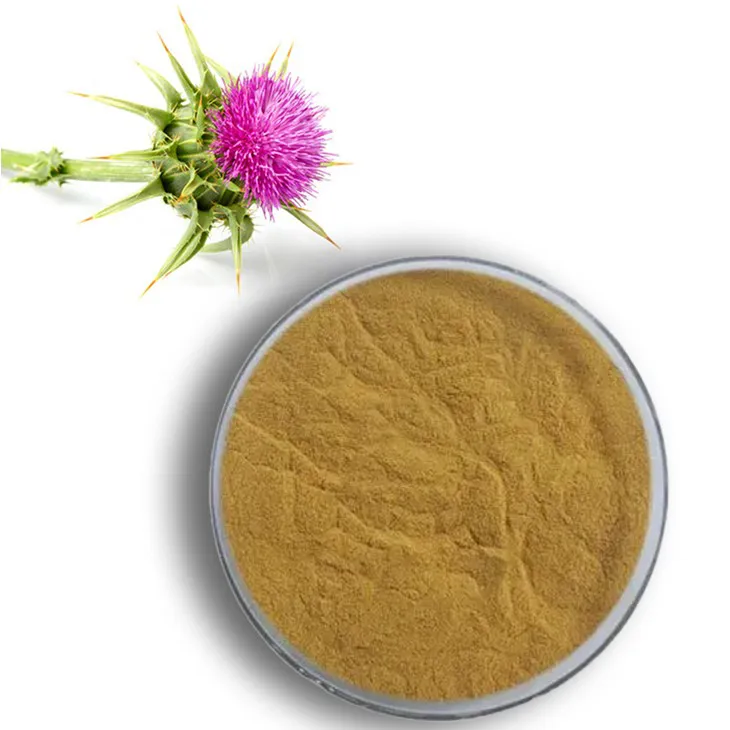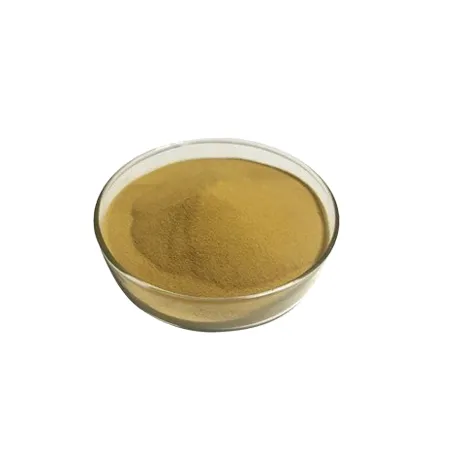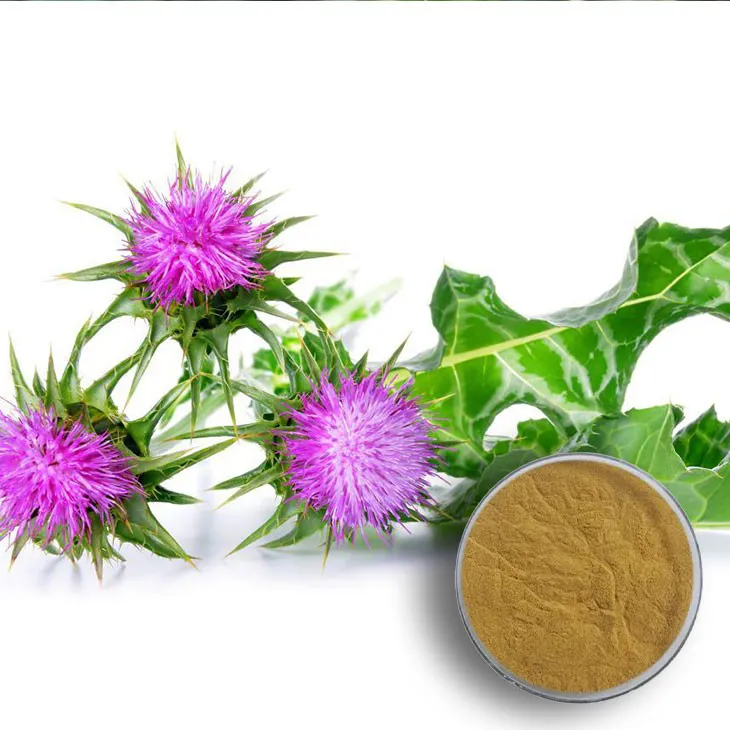- 0086-571-85302990
- sales@greenskybio.com
Milk Thistle Extract - Chinese Manufacturer, Supplier, Factory
2024-12-18

1. Introduction to Milk Thistle Extract
Milk Thistle Extract has been gaining significant popularity in recent years due to its numerous health benefits. It is rich in silymarin, a compound known for its antioxidant, anti - inflammatory, and liver - protecting properties. As the global demand for natural health products rises, the role of Chinese manufacturers, suppliers, and factories in the production of Milk Thistle Extract has become increasingly crucial.

2. Chinese Manufacturers: Leveraging Agricultural Resources
Abundant Agricultural Resources
China is blessed with a vast expanse of arable land and diverse climatic conditions, which are highly conducive to the cultivation of milk thistle. Manufacturers in China take full advantage of these rich agricultural resources to ensure a stable supply of milk thistle for extraction. They have established large - scale cultivation bases in suitable regions, carefully selecting high - quality milk thistle seeds for sowing.
Advanced Cultivation Techniques
To improve the yield and quality of milk thistle, Chinese manufacturers also employ advanced cultivation techniques. These include proper irrigation, fertilization, and pest control methods. For instance, they use drip irrigation systems to ensure that the plants receive the right amount of water at the right time. In terms of pest control, they prefer environmentally - friendly biological control methods rather than relying solely on chemical pesticides. This not only protects the environment but also ensures that the milk thistle is free from harmful chemical residues.

3. Sophisticated Extraction Technologies
Isolation of Beneficial Components
Chinese manufacturers are equipped with sophisticated extraction technologies that can precisely isolate the beneficial components from milk thistle, such as silymarin. These technologies involve a series of complex processes, starting from the harvesting of milk thistle to the final extraction of the active ingredients. For example, they use advanced solvent extraction methods, carefully selecting the appropriate solvents to ensure maximum extraction efficiency while maintaining the integrity of the active components.
Quality Control in Extraction
Stringent quality control measures are implemented during the extraction process. Manufacturers have well - equipped laboratories where they conduct regular tests on the extracted milk thistle extract. They monitor parameters such as the purity of silymarin, the presence of contaminants, and the overall quality of the extract. This ensures that the final product meets international quality standards and is safe for consumption.

4. Chinese Suppliers: Global Distribution Network
Understanding International Market Trends
Chinese suppliers play an important role in the global distribution network of milk thistle extract. They have a good understanding of international market trends, constantly monitoring changes in consumer demands and regulatory requirements in different countries. For example, they are aware of the increasing preference for organic and natural products in many Western markets. Based on this understanding, they can adjust their product offerings and marketing strategies accordingly.
Effective Promotion and Distribution
Chinese suppliers are highly effective in promoting and distributing milk thistle extract products. They participate in international trade fairs and exhibitions, showcasing their high - quality products to potential customers from all over the world. They also establish strong relationships with international distributors and retailers, ensuring that their products can reach a wide range of consumers. In addition, they use various marketing channels, such as online platforms and social media, to increase brand awareness and product visibility.
Customer - Oriented Service
Their customer - oriented service is another factor that makes Chinese suppliers a preferred choice for many international buyers. They are responsive to customer inquiries, providing timely and accurate information about their products. They also offer after - sales support, such as handling product returns and addressing customer complaints in a professional and efficient manner.
5. Chinese Factories: Sustainable Production
Organic Cultivation Promotion
Chinese factories are committed to sustainable production. They promote the organic cultivation of milk thistle, which has several advantages. Organic cultivation not only improves the quality of the raw material but also protects the environment. By using organic fertilizers and natural pest control methods, factories can reduce the environmental impact associated with traditional cultivation methods. Moreover, organic milk thistle extract is often more appealing to consumers who are concerned about environmental and health issues.
Innovations in Product Formulation and Packaging
In addition to promoting organic cultivation, Chinese factories are constantly innovating in product formulation and packaging. In terms of product formulation, they are researching and developing new forms of milk thistle extract, such as encapsulated forms or combined products with other beneficial ingredients. These new formulations can enhance the bioavailability and efficacy of the extract. Regarding packaging, they are using more environmentally - friendly materials, such as recyclable plastics or biodegradable materials. At the same time, they are also focusing on the design of packaging to make it more attractive and convenient for consumers.
6. Conclusion
In conclusion, China's manufacturers, suppliers, and factories are making significant contributions to the global milk thistle extract market. Through leveraging agricultural resources, employing sophisticated extraction technologies, understanding international market trends, and promoting sustainable production, they are able to produce high - grade water - extract of milk thistle that meets international quality standards and is well - received in the international market. As the demand for natural health products continues to grow, it is expected that Chinese players in this industry will play an even more important role in the future.
FAQ:
What are the advantages of Chinese - made milk thistle water - extract?
Chinese - made milk thistle water - extract has several advantages. Firstly, manufacturers utilize rich agricultural resources to ensure a stable supply of milk thistle for extraction. Secondly, they use sophisticated extraction technologies to precisely isolate beneficial components like silymarin, resulting in high - grade products that meet international quality standards. Also, Chinese suppliers have strong marketing capabilities and customer - oriented service, and Chinese factories are committed to sustainable production and continuous innovation in product formulation and packaging.
How do Chinese manufacturers ensure the quality of milk thistle water - extract?
Chinese manufacturers ensure the quality of milk thistle water - extract in multiple ways. They start with leveraging rich agricultural resources to get a stable supply of high - quality milk thistle. Then, they employ advanced extraction technologies which can accurately isolate the beneficial components such as silymarin. Moreover, they follow international quality standards throughout the production process to ensure the final product is of high grade.
What role do Chinese suppliers play in the global market of milk thistle water - extract?
Chinese suppliers play a very important role in the global market of milk thistle water - extract. They have a good understanding of international market trends and customer preferences. This allows them to effectively promote and distribute milk thistle water - extract products. Their strong marketing capabilities and customer - centered service make them a preferred choice for many international buyers.
How are Chinese factories promoting sustainable production of milk thistle water - extract?
Chinese factories are promoting sustainable production of milk thistle water - extract in several ways. They encourage the organic cultivation of milk thistle. This not only enhances the quality of the raw material but also protects the environment. Additionally, they keep innovating in product formulation and packaging to boost the competitiveness of milk thistle water - extract in the international market.
What makes Chinese milk thistle water - extract competitive in the international market?
There are multiple factors that make Chinese milk thistle water - extract competitive in the international market. High - quality raw materials ensured by rich agricultural resources, advanced extraction technologies to isolate beneficial components, high - grade products meeting international standards, effective promotion and distribution by suppliers with strong marketing capabilities, and sustainable production and innovation in factories all contribute to its competitiveness.
Related literature
- Beneficial Effects of Milk Thistle Extract: A Review"
- "The Production and Quality Control of Botanical Extracts: A Case of Milk Thistle"
- "Milk Thistle in the Global Herbal Market: Production and Supply Chains"
- ▶ Hesperidin
- ▶ citrus bioflavonoids
- ▶ plant extract
- ▶ lycopene
- ▶ Diosmin
- ▶ Grape seed extract
- ▶ Sea buckthorn Juice Powder
- ▶ Beetroot powder
- ▶ Hops Extract
- ▶ Artichoke Extract
- ▶ Reishi mushroom extract
- ▶ Astaxanthin
- ▶ Green Tea Extract
- ▶ Curcumin Extract
- ▶ Horse Chestnut Extract
- ▶ Other Problems
- ▶ Boswellia Serrata Extract
- ▶ Resveratrol Extract
- ▶ Marigold Extract
- ▶ Grape Leaf Extract
- ▶ blog3
- ▶ blog4
- ▶ blog5
-
Pure 85% Tomentil Extract.
2024-12-18
-
Black Pepper Extract
2024-12-18
-
Angelica sinensis extract
2024-12-18
-
Alisma Extract
2024-12-18
-
Green Tea Extract
2024-12-18
-
Polygonum multiflorum extract
2024-12-18
-
White mustard seed extract
2024-12-18
-
White Willow Bark Extract
2024-12-18
-
Tamarind extract powder
2024-12-18
-
Curcuma Longa Extract/Turmeric extract
2024-12-18
-
Withania Somnifera Extract
2024-12-18





















